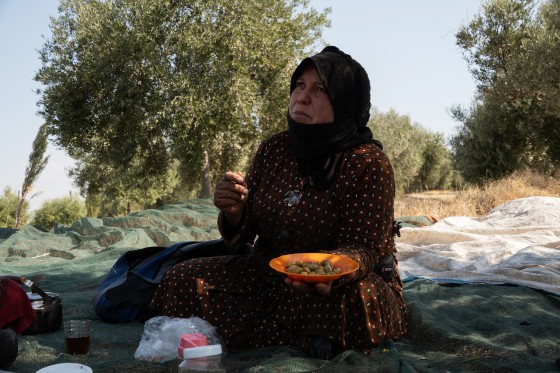
Lebanon’s AABRA Despite the constant fear of bombs, Mayada El Sayed effectively removes ripe olives from a tree while wearing duct tape across her fingers to prevent bruises.
A 45-minute drive south of the capital, Beirut, and a few miles inland from Lebanon’s Mediterranean coast, El Sayed, 45, said she was afraid of the frequent strikes, one of which was less than half a mile from Bustan El Zeitoun Grove, where she was employed, as Israel advances into the neighboring country to combat the militant group Hezbollah.
The mother of three expressed concern about what might happen to her kids at their house in Haret Saida, a community where numerous Israeli bombings have targeted residences and commercial buildings. She expressed her concern that she might not be able to return home to them.
The day following the October 7, 2023, Hamas terror assaults, Hezbollah launched rockets into northern Israel. Since combat started last year, more than 3,600 people have died in Lebanon, according to health officials. According to the UN refugee agency, there are 1.3 million internally displaced persons.
Israel claims that during the past year, Hezbollah attacks have killed roughly 100 soldiers and civilians in southern Lebanon, the Israeli-occupied Golan Heights, and northern Israel. Additionally, 60,000 inhabitants have been evacuated from the northern region.Until those displaced Israeli families can safely return home, Prime Minister Benjamin Netanyahu has threatened to take military action against Hezbollah.
Farm to table
Farmers are suffering other significant losses in the midst of the deaths and widespread migration. According to a February report from the United Nations Food and Agriculture Organization, more than 47,000 olive trees had already been lost in southern Lebanon just one month into the fighting, despite the fact that olives are one of the region’s most important commodities.
With Israel intensifying its air and ground operation and deploying troops and tanks into the area in September, things have only gotten more difficult for olive farmers since then.
According to Walid Mushantaf, manager of Bustan El Zeitoun, farmers are extremely susceptible because they wait all year to harvest and depend on their produce for their livelihood.
Mushantaf claimed that their harvests will be wasted because many other farmers had been unable to access their orchards.
After the Lebanese Civil War ended in 1990, he sought to expand his farm. He claimed that before he transformed it, the property had been designated as a construction site.
My grandfather used to go to the olive grove and have a summertime siesta under a tree, he added, and I know this since I was born in this village. He thought of it as his second home.
El Sayed claimed to be the only provider for her family, living with her husband, their three children, Ibrahim, 16, Ahmed, 14, and Zainab, 12, as well as her mother-in-law.
We are responsible for paying the government’s water and internet bills, rent for the residence, and power. “We have to eat and work,” she continued.
At the end of the day, she returns home, but there are fifteen other employees who reside at the Grove.
One of them, 32-year-old Youssef Muqbil, is an Egyptian who said that in his native Egypt, he depends on olive cultivation to provide for his wife and their two children, aged 11 and 13.
The grove’s employees hide in their homes when they learn of airstrikes in the area, but the noises continue.
He explained how frightening these situations are for the workers, saying, “The strikes are so near us.”
Following the bombing of the equipment required to process the olives, Rose Bechara Perini’s business, Darmmess, suffered a serious setback as a result of the war.
Many farmers from Deir Mimas, the area where her company is headquartered, have been forced to relocate to Beirut and are hoping for a miracle that would enable them to return home and resume their livelihoods in safety, she continued.
The economy is olives. She claimed that it is our legacy, our source of income, and our means of subsistence. In the village, it is everything.
Note: Every piece of content is rigorously reviewed by our team of experienced writers and editors to ensure its accuracy. Our writers use credible sources and adhere to strict fact-checking protocols to verify all claims and data before publication. If an error is identified, we promptly correct it and strive for transparency in all updates, feel free to reach out to us via email. We appreciate your trust and support!
